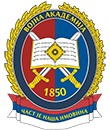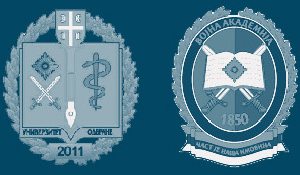Basic academic studies
The Military Academy is an accredited educational and scientific research institution of the University of Defence of the Ministry of Defence of the Republic of Serbia intended for training officers for the needs of all branches and services of the Serbian Armed Forces in accordance with the missions and tasks of our Armed Forces, which include: defence of the Republic of Serbia from external armed threats, participation in building and maintaining peace in the region and the world and support to civilian authorities in countering security threats.
The Military Academy provides higher education in undergraduate studies, master’s studies and doctoral/PhD studies, organizes postgraduate professional training, trains students for reserve officers and organizes basic, applied and developmental research important for raising the quality of higher education, training of scientific and teaching staff and the introduction of cadets in scientific work.
Education and training in undergraduate studies lasts for four years and the total number of ECTS that a cadet needs to achieve in order to complete this level is 240 points. After completing the studies, cadets receive a diploma of an officer or a BSc in engineering in accordance with the study programme, are admitted to professional military service, promoted to the rank of second lieutenant and become officers.
Study programmes cover a large number of different scientific and professional fields. The contents of the study programmes are designed to provide future officers with the necessary level of knowledge and skills for successful command of branch – service units and exploitation and maintenance of weapons and military equipment within the missions and tasks of the Serbian Armed Forces.
This is achieved through:
- extensive broad general education, which allows officers to have a broader view of the circumstances of all events and activities;
- adoption of the necessary scientific and professional-applied knowledge and skills within a certain branch or service;
- developing leadership skills necessary for the successful performance of senior duties; developing high moral personality traits and
- continuous improvement of teaching staff and modernization of study programmes.
Undergraduate studies are conducted through eight study programmes:
- Land Forces,
- Military Electronic Engineering,
- Military Mechanical Engineering,
- Technological Engineering of Materials and Protection,
- Defence Logistics,
- Traffic Engineering,
- Military Aviation.
Study programmes have the character of interdisciplinary studies in the fields of social sciences and humanities, natural sciences and mathematics and technological sciences.
The study programme Land Forces belongs to the scientific field of Military Science and focuses on the social sciences and humanities. Future branch officers of the Army/Land Forces, such as infantry, armoured units, artillery, engineering and river units are trained.
All other study programmes focus on technological sciences and natural sciences and mathematics. The study programme Technological Engineering of Materials and Protection belongs to the scientific field of environmental science, and the study programmes Military Electronic Engineering, Military Mechanical Engineering, Military Chemical Engineering, Traffic Engineering, Military Geodetic Engineering and Military Aviation belong to the scientific field of mechanical, electronic, technological, geodetic and traffic engineering. The study programme Defence Logistics has the nature of IMT (interdisciplinary, multidisciplinary and transdisciplinary) studies.
Every activity at the Military Academy is based on the high expertise of the staff, as the main pillar of the officer’s authority. The guiding principles of teaching are the obviousness and constant testing of new knowledge through practice, which contributes to the development and strengthening of self-confidence in young people. The knowledge acquired in practical independent or team work gives a special stamp to the overall education, and the pronounced interdisciplinary nature of study programmes and a large share of practical knowledge and skills give the young officer the opportunity to successfully perform professional tasks in changing and very dynamic circumstances, which characterize both the modern world and the military profession itself.
Cadets are also allowed to obtain international certificates for English STANAG 6001 (international military standard) and ECDL (European Computer Driver License), training in driving motor vehicles to obtain a driver’s license “C” category and training in skiing at the ski centre of the Military Academy on Kopaonik.
The study programme Land Forces belongs to the scientific field of Military Science and focuses on the social sciences and humanities. Future branch officers of the Army/Land Forces, such as infantry, armoured units, artillery, engineering and river units are trained.
All other study programmes focus on technological sciences and natural sciences and mathematics. The study programme Technological Engineering of Materials and Protection belongs to the scientific field of environmental science, and the study programmes Military Electronic Engineering, Military Mechanical Engineering, Military Chemical Engineering, Traffic Engineering, Military Geodetic Engineering and Military Aviation belong to the scientific field of mechanical, electronic, technological, geodetic and traffic engineering. The study programme Defence Logistics has the nature of IMT (interdisciplinary, multidisciplinary and transdisciplinary) studies.
Every activity at the Military Academy is based on the high expertise of the staff, as the main pillar of the officer’s authority. The guiding principles of teaching are the obviousness and constant testing of new knowledge through practice, which contributes to the development and strengthening of self-confidence in young people. The knowledge acquired in practical independent or team work gives a special stamp to the overall education, and the pronounced interdisciplinary nature of study programmes and a large share of practical knowledge and skills give the young officer the opportunity to successfully perform professional tasks in changing and very dynamic circumstances, which characterize both the modern world and the military profession itself.
Cadets are also allowed to obtain international certificates for English STANAG 6001 (international military standard) and ECDL (European Computer Driver License), training in driving motor vehicles to obtain a driver’s license “C” category and training in skiing at the ski centre of the Military Academy on Kopaonik.

